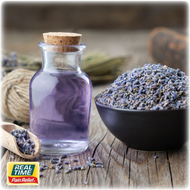5 Reasons to Love Lavender Oil
14th Feb 2023
Essential oils for aromatherapy are used for a variety of physical and emotional problems. They are compounds that are extracted from plants, and the oils are often used in aromatherapy, which is a form of alternative or complementary medicine. Although they have been around for centuries, the use of essential oils has grown in popularity in recent years.
One of the most popular oils is lavender oil, which comes from the Lavandula angustifolia plant. Lavender oil is used to treat a variety of issues, from stress to pain. Keep reading to learn about 5 reasons to love this essential oil!
5 Ways Lavender Oil May Benefit You
Although essential oils may not work for everyone, they rarely cause adverse reactions. Lavender oil may help with the following issues:
#1) Sleep Problems
One of the benefits of lavender oil is that it helps ease tension and promote relaxation, which leads to better quality sleep. One study in the Journal of Alternative and Complementary Medicine involved 79 college students that reported sleep problems. The student’s sleep was assessed using a sleep diary, Fitbit tracker, and completing the Pittsburg Sleep Quality Index.
The students were divided into two groups. One group wore a patch infused with lavender oil, and one group wore a blank patch. The results indicated that the group that wore the lavender oil-infused patch reported better sleep quality and improved daytime vibrancy and energy levels.
Another study published in the journal Nursing in Critical Care looked at the effect of lavender oil on anxiety and sleep level in people in the coronary intensive care unit.
The study involved 60 people in the ICU. The participants were divided into two groups and answered a questionnaire to measure sleep and anxiety levels. One group was given 2% lavender essential oil through inhalation for 15 days, and the other group did not receive any lavender oil. The group that inhaled the lavender oil reported reduced anxiety and improved sleep.
#2) Anxiety
Using lavender oil may also help combat anxiety and stress. Researchers also think that applying a cream or product that contains lavender oil or breathing it in sends messages to a specific area of the brain called the limbic system. The limbic system affects the nervous system and may play a role in regulating emotions, such as anxiety.
#3) Wound Healing
Applying lavender oil to the skin may have some wound healing benefits. Research published in BMC Complementary Medicine and Therapies found that the use of lavender oil may promote the healing of the skin from wounds, such as scrapes, cuts, and burns. According to the research, lavender oil may help promote collagen production. It may also increase the number of fibroblasts, which help synthesize collagen.
#4) Soothes Skin
In addition to wound healing, lavender oil may help soothe irritated skin. Lavender oil may have an anti-inflammatory effect as well as antibacterial properties. Because of its anti-inflammatory and antibacterial effect, lavender oil may help decrease acne and skin irritation.
#5) Pain
Lavender oil may help reduce pain in some people. The theory is lavender oil contains linalool and linalyl acetate, which are monoterpenes that are quickly absorbed into the bloodstream. Some studies show these compounds may have a pain-relieving and sedative effect.
The combination of pain reduction and relaxation may improve sleep. In turn, better sleep can help someone cope with stress and pain better.
Other Possible Benefits of Lavender Oil
Although more research is needed to say whether lavender oil definitively helps other conditions, proponents of essential oils offer other possible benefits. Lavender oil may help with the following conditions:
- Allergies
- Eczema
- Nausea
- Menstrual cramps
- Depression
- Fungal infections
Side Effects, Precautions, and How to Use
Since essential oils are not regulated by the FDA, there is no specific dosage that is recommended for lavender oil. The exact amount to use and frequency of use usually depends on the specific product.
Most people tolerate using lavender oil without any adverse reactions. Although it is possible for any essential oil, including lavender oil, to cause minor skin irritation, allergic reactions are uncommon.
Unless an individual has an allergy, it is safe to use lavender oil or a product containing lavender oil daily. But ingesting lavender oil is not recommended unless done under the direction of your doctor.
The main way to use lavender oil is through inhalation or applying it directly to the skin. For example, one way to use lavender oil is with a diffuser. The diffuser allows the scent to fill the air for aromatherapy for the user to breathe in.
Another option is to use a product, such as a cream that contains lavender. Various types of creams to promote pain relief and improve sleep that contains lavender oil are applied directly to the skin.
For over 20 years, families across the U.S. have turned to Real Time’s lotions and creams for PAIN RELIEF YOU CAN TRUST®. From Lifestyle Essentials, through our Nujuvena line, to Pain Relief Formulas, Real Time has you covered.
Sources:
https://www.ncbi.nlm.nih.gov/pmc/articles/PMC4505755/pdf/acm.2014.0327.pdf
https://www.nccih.nih.gov/health/lavender
https://www.naturalmedicinejournal.com/journal/2012-02/lavender-oil-anxiety-and-depression-0
https://community.csusm.edu/pluginfile.php/218982/mod_resource/content/1/Anxiety_Aromatherapy%20Stress%20and%20Anxiety%20in%20Coronary%20ICU(2).pdf
https://ncbi.nlm.nih.gov/pmc/articles/PMC4880962/pdf/12906_2016_Article_1128.pdf





